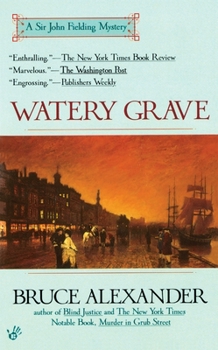Book Overview
In this third adventure, Sir John Fielding returns in his most baffling case yet. His stepson returns from high seas with tales of storms and a captain overboard. Was it an accident, or was it murder? Fielding is asked to investigate, but discovers considerably more than he'd bargained for. Filled with the authentic sights and sounds of eighteenth-century London, and with a supremely colorful and varied cast of characters, Watery Grave is in...
Format:Mass Market Paperback
Language:English
ISBN:042516036X
ISBN13:9780425160367
Release Date:October 1997
Publisher:Berkley Books
Length:320 Pages
Weight:0.35 lbs.
Dimensions:0.9" x 4.2" x 6.8"
Age Range:18 years and up
Grade Range:Postsecondary and higher
Customer Reviews
5 ratings
Watery Grave is worth the read
Published by Thriftbooks.com User , 16 years ago
While this third entry from Bruce Alexander's (Sir John Fielding) series may not be historically accurate, it only claims to be fiction. I found the depiction on the 18th century Royal Navy's dogmatic approach to justice all too realistic. I thoroughly enjoyed Watery Grave, even though the theme is a bit of a departure from Mr. Alexander's two previous novels. A good mystery is still a good mystery. If you are looking for a nautical novel, you are better served with Patrick O'Brian or Alexander Kent.
A Wonderful Series Starts Here
Published by Thriftbooks.com User , 17 years ago
I love a good mystery. A mystery set in England is even better. A mystery set in England in the 1700s is a ten-strike! Have you read any of Bruce Alexander's books in the Sir John Fielding series? Starting with "Watery Grave", the reader follows the career of Sir John Fielding, a blind judge. Based on a historical character, Sir John actually lived in the 1700s and was the first judge to develop a regular constabulary -- the legendary Bow Street Runners. His brother, Henry Fielding, wrote the classic "Tom Jones". The narrator is a young boy, Jeremy Proctor, who becomes Sir John's ward and protege. We see London through the eyes of this child -- as he grows into manhood. Bruce Alexander's language is rich and evocative of the times. The mysteries are anything but derivative and often solved in completely surprising ways. Courts handled crimes so differently in the 18th century -- and most people lived in squalid conditions which Alexander captures honestly. These books are not "chick lit" -- in fact, men may enjoy them even more than women! I'd suggest you start with the first book in the series and work your way along so you can get the most of the character development and big picture. Enjoy!
Much better than the 2d book
Published by Thriftbooks.com User , 20 years ago
Like the first in the series, good fun historical fiction mystery. Not as weighty as Follet's Pillars of the Earth, but doesn't need to be. It is not timeless literature, but an engrossing adventure with great historical detail for added flavor. An excellent plane or beach read.
Another Hit!
Published by Thriftbooks.com User , 22 years ago
I have read the other reviews of this novel. I would like to say that this is a fantastic novel.I really enjoyed the story as well as the different characters.I am in the process of reading all the Sir John novels (reading #5 as we speak). I undertand the argument about the speech and historical errors,however i think don't think it takes that much away from the story.unless you are well versed on the speech and customers of England in the 1700's then it will not matter.Try this series out,read Blind Justice and I'm sure you will not be sorry. Simply put it's just a good yarn!
A good yarn, but lacks Alexander's usual historical accuracy
Published by Thriftbooks.com User , 26 years ago
Perhaps the most attractive feature of Alexander's previous works - Blind Justice and Murder in Grubb Street - is their uncompromising historical accuracy. As a lawyer (Queen's Counsel), I can attest to the validity of Alexander's depiction of the administration of justice in 18th Century England. One can quibble with some of his characterizations: for example, his portrayal of Lord Chief Justice Mansfield hardly fits with the image of the jurist who declared that a slave becomes a free man as soon as he sets foot on English soil. And his use of modern Americanisms - such as "hung" rather than "hanged" as the past participle of the verb "to hang" when referring to execution by hanging - tends to grate when applied to the supposed dialogue of 18th Century Londoners. But, by and large, Alexander manages well, both to capture the atmosphere of the era, and also to satisfy even the most pedantic critic of his historicism. Shadowy Grave is therefore slightly disappointing. Speaking also as a former naval officer, I found that Alexander's mastery of the atmosphere in London's streets of the 18th Century does not, unfortunately, extend to a mastery of the atmosphere aboard ships of the Royal Navy of that time. And, by transferring the court-room dramatics from a civil court to a naval court martial, Alexander has exposed some weaknesses in his knowledge of authentic naval procedures and traditions. Still, fans of Alexander's previous works will enjoy Watery Grave. If the plot is, at times, a little far-fetched, it is still plausible and makes for an exciting narrative. It is to be hoped that Alexander will continue this exceptionally good series, although preferably keeping his feet on dry land and sticking to the historical subjects which he knows best and evokes so effectively.





